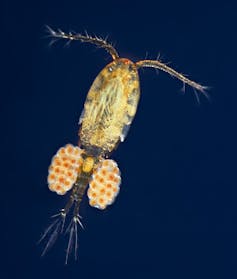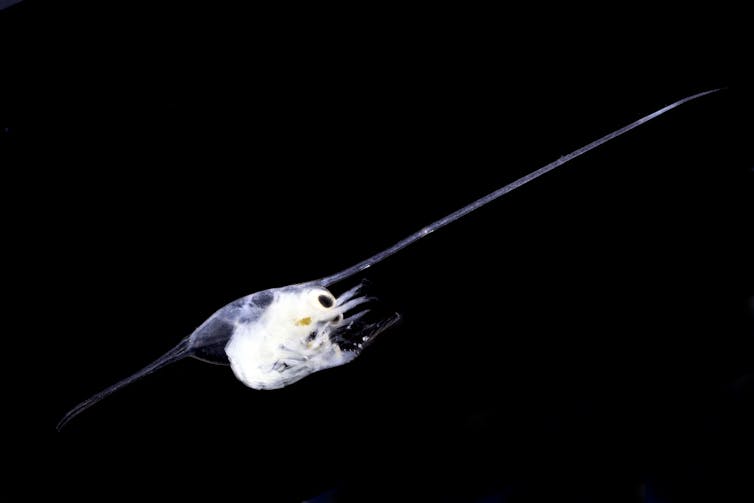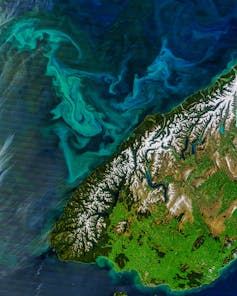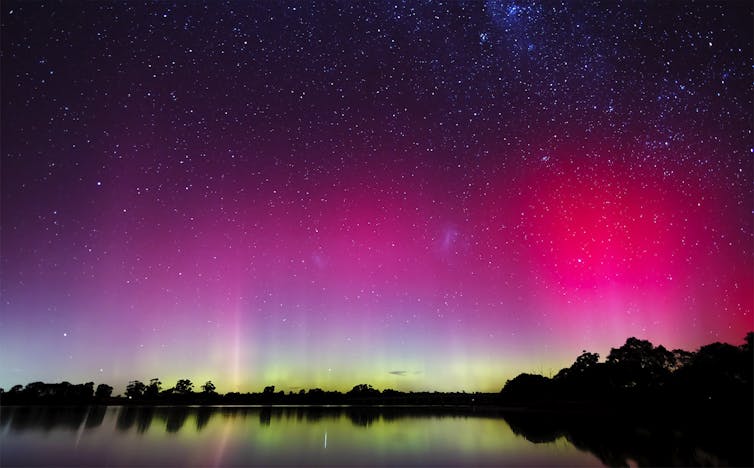As a plankton ecologist who has worked to raise their profile globally, I hope I can convince you that these creatures deserve your attention.
Phytoplankton, the algae plankton, are single-celled organisms. Many of them have chlorophyll, a green pigment (like land plants) they use for photosynthesis to produce the oxygen we breathe. Throughout time, phytoplankton have produced roughly half of Earth’s oxygen, making our atmosphere inhabitable today.
Like land plants, phytoplankton form the base of the marine food web. While cows graze grass on land, zooplankton, tiny marine animals, eat phytoplankton.
Zooplankton include one of Earth’s most abundant animals, the copepod: a microscopic crustacean ranging in size from 0.5 to 15mm. Large copepods are eaten by larval fish, which scientists also classify as plankton since they are too weak and small to swim against the ocean currents. These larvae grow into fish that are eaten by animals higher up the food web, such as sharks, birds and humans.

Copepod with eggs. Lebendkulturen.de/Shutterstock
Planktonic krill, a shrimp-like crustacean up to 5cm in size, make up most of the diet of the largest vertebrate to ever live on Earth, the blue whale. Blue whales eat by filtering seawater through their comb-like baleen, pushing out water while keeping the plankton in their mouth.
Unlike most sharks, basking sharks and whale sharks don’t have teeth, and eat copepods, krill and other plankton. It’s amazing to think that microscopic animals are the diet of such huge creatures.
Life cycles
Some zooplankton, like copepods and krill, spend their entire lives in the water column between the surface and bottom of the sea, rather than on the seafloor. Other zooplankton only live in the water column during their larval stages, before maturing and settling to the sea floor or, like larval fish, developing the ability to swim against the currents.
In spring, the sea is full of planktonic crab larvae, flicking their tails to swim as they hunt small copepods and other plankton. Crab larvae don’t look like adult crabs: they have huge spines on the tops and bottoms of their heads, and are long and thin rather than round with pincers. As crab larvae grow through their life stages, they look more and more like their adult selves until, finally, they drop to the sea bottom.
Lobsters, mussels, limpets and barnacles also live as plankton in their larvae stages.

Crab larvae have huge spines. Chris Moody/Shutterstock
Astonishing diversity
Scientists estimate there are around 100,000 plankton species in the sea. Plankton communities vary throughout the Earth’s seas and oceans, particularly with latitude. Warmer waters generally have lower plankton biomass and abundance, and consist of species with smaller body sizes.
Jellyfish, my favourite type of zooplankton, are among the biggest plankton. Despite their large size (up to 120 metres long in the case of the Lion’s Mane jellyfish), jellyfish are still considered plankton because they can’t swim against the currents and tides. Instead, they pulse through the water.
There are other types of plankton which are much smaller. These are the pico- and nano-plankton that are too small to see with a classic microscope. These tiny plankton absorb nutrients from, and help decompose, waste such as faeces, dead organisms and other biological material from other parts of the food web. This microbial loop wasn’t discovered until the 1980s.
There is so much about plankton that we still don’t know, and there are thousands of species yet to be discovered.
Climate change canaries
Plankton are extremely sensitive to changes in their environment, which means they respond quickly to alterations in sea temperature and acidity. As sea temperatures rise, warm water plankton communities are shifting away from the equator, into newly temperate environments, while cold water plankton communities are being squeezed poleward.
In the North-east Atlantic ocean, for example, plankton have shifted 1,000 miles northward since the 1960s. But these aren’t the same individuals moving – this is the whole plankton community shifting, over millions of individual lifespans.
Some plankton groups use calcium carbonate, or chalk, to form their shells. As the oceans acidify, plankton that depend on calcium carbonate struggle to form their shells, which protect them from predators and give their bodies structure.
Coccolithophores, a phytoplankton group covered in calcium carbonate liths (external plates), developed malformations in laboratory experiments that manipulated seawater pH. We are not yet sure of the extent that wild populations of coccolithophores are affected by pH change, but they are certainly important to both marine food webs and the removal of atmospheric carbon.
Plankton may be tiny but phytoplankton blooms, which are dense aggregations of microscopic single-celled phytoplankton, can span hundreds of kilometres across the ocean’s surface, and are visible from space using satellites.

Phytoplankton bloom off South Island, New Zealand. Best-Backgrounds/Shutterstock
These huge blooms sink to the sea floor when the plankton die, transporting carbon to the deep sea and helping to fight climate change.
While plankton blooms like this are usually natural phenomena, they may also occur due to excess nutrients from farming or sewage. If blooms are too big or too concentrated due to excess nutrients, they can cause hypoxic (no oxygen) dead zones on the seafloor. These kill everything that lives there, including animals that can’t escape this deadzone quickly.
There are few groups that are so biodiverse and important for how our oceans, indeed our entire planet, function. The next time you are on a boat or at the beach and look out at the sea, remember that each drop of water is full of microscopic life that makes our planet what it is.
Abigail McQuatters-Gollop, Associate Professor of Marine Conservation, University of Plymouth
This article is republished from The Conversation under a Creative Commons license. Read the original article.






 Volunteers of the Hellenic Red Cross hand out bottles of water at the Acropolis hill in Athens in July 2023 as Greece was hit by a heatwave © Spyros BAKALIS / AFP/File
Volunteers of the Hellenic Red Cross hand out bottles of water at the Acropolis hill in Athens in July 2023 as Greece was hit by a heatwave © Spyros BAKALIS / AFP/File



